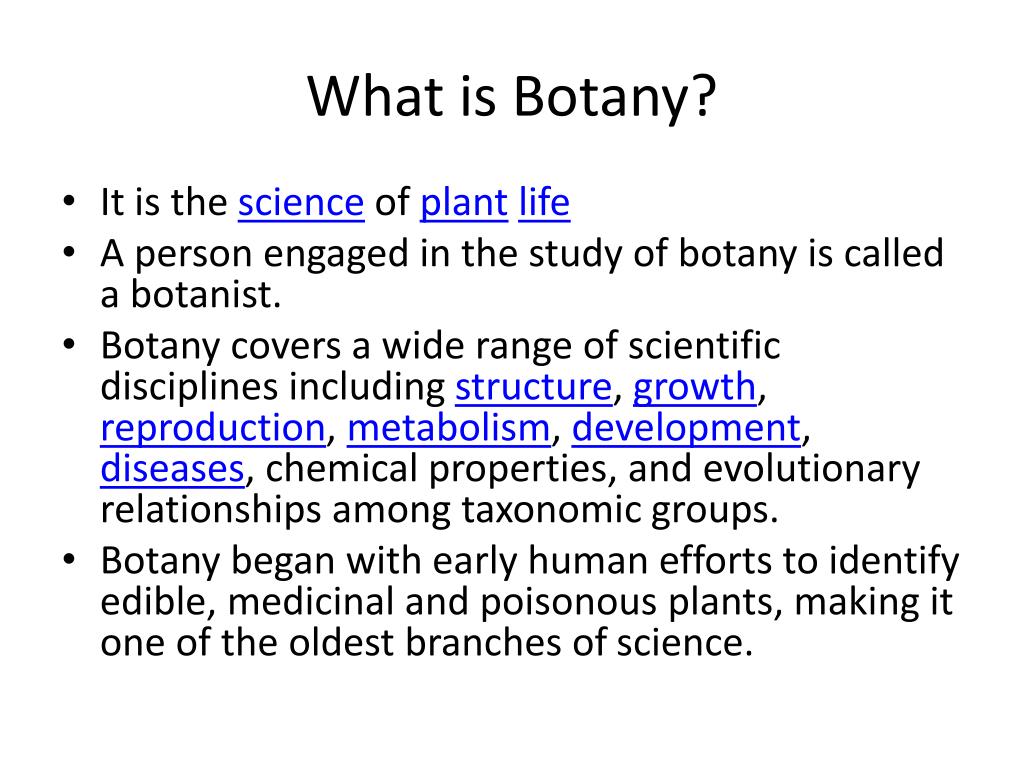Botany is the scientific study of what plants

Botany: The Scientific Study of Plants

Botany, often referred to as plant biology, is the scientific study of plants. It covers a wide range of disciplines, including their structure, growth, reproduction, metabolism, development, diseases, and evolutionary relationships. Botanists explore various aspects of the plant kingdom to gain insights into the fascinating world of plants.
Plants play a crucial role in our lives, providing food, medicine, shelter, and oxygen. They contribute significantly to our biodiversity and environmental balance. Understanding plants at a scientific level allows us to harness their benefits while also preserving and protecting them.
The main objective of botany is to increase our knowledge and comprehension of plants, enabling us to make informed decisions regarding their utilization and conservation. By studying plants, botanists can unravel the intricate mechanisms involved in their growth, development, and interactions with the environment. This knowledge can then be applied in various fields, such as agriculture, pharmacology, forestry, and ecology.
Subdisciplines in Botany

Botany encompasses several subdisciplines, each focusing on a specific aspect of plant life. Some of the prominent branches of botany include:
1. Plant Anatomy:
The study of the internal structure and organization of plants, including cells, tissues, and organs.
2. Plant Physiology:
The investigation of the functions and processes within plants, such as photosynthesis, respiration, and water uptake.
3. Plant Taxonomy:
The classification, identification, and naming of plants, creating a system to categorize them based on their characteristics.
4. Plant Ecology:
The study of how plants interact with their environment and other organisms, including their distribution and adaptations.
5. Plant Genetics:
The exploration of how traits are inherited and how genetic information is passed on in plants.
6. Ethnobotany:
The examination of how different cultures use plants for food, medicine, rituals, and other purposes.
7. Plant Biotechnology:
The utilization of plant cells and tissues to develop improved crops, medicines, and sustainable solutions.
These subdisciplines synergistically contribute to our understanding of plants, enhancing our ability to conserve biodiversity and develop innovative solutions for global challenges.
Importance of Botany
The field of botany holds immense importance due to its practical implications and contributions to various sectors. Here are some key reasons why botany is crucial:
1. Agriculture and Food Security:
Botany plays a vital role in enhancing crop production, improving plant genetics, and developing sustainable agricultural practices. By understanding plant growth, nutrient requirements, and resistance to diseases, botanists help ensure global food security.
2. Medicinal Applications:
Plants have been used for medicinal purposes since ancient times. Botanists study the chemical makeup of plants to identify potential medicinal compounds, contributing to the development of new drugs and treatments.
3. Conservation of Plant Diversity:
As plants face threats like habitat destruction and climate change, botanists play a crucial role in conserving and protecting plant species. They study endangered plants, promote habitat restoration, and raise awareness about the importance of biodiversity conservation.
4. Environmental Sustainability:
By studying plant ecology and ecosystems, botanists contribute to environmental sustainability efforts. They analyze vegetation patterns, invasive plant species, and the impact of pollution, aiding in the conservation and restoration of ecosystems.
5. Climate Change Research:
Plants are integral to the global carbon cycle and climate regulation. Botanists study plant responses to climate change, contributing to the understanding of its impacts and potential mitigation strategies.
In conclusion, botany allows us to decipher the secrets of the plant world, revealing their inner workings and significance. By exploring the various branches of botany, we gain insights into the diverse aspects of plants, enabling us to utilize their benefits sustainably and conserve their invaluable contributions to our planet.
Additional Sources:
Tags
Share
Related Posts
Quick Links
Legal Stuff

